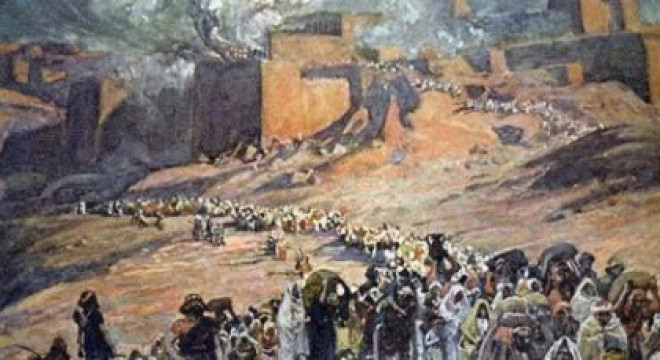
Fast of Gedaliah
The Fast of Gedaliah, Why?
The fast of Gedaliah always falls a day after Rosh Hashanah on the third of Tishrei. It was established by our Sages to commemorate the assassination of Gedaliah ben Achikam, sometime after the destruction of the first Temple.
In fact, he was murdered on Rosh Hashanah. However, fast days being banned on festivals, the day of abstinence was postponed to the third of Tishri. This murder practically wiped out the presence of the Jews who survived the destruction of the first Temple and remained in Eretz Israel.
A Bit of Historical Background...
During the exile of the children of Israel, Nebuchadnezzar decided to maintain a weak Jewish presence in Jerusalem. His alibi was primarily financial. Indeed, the Jews of the time specialized in the treatment of Tekhelet, a magnificent azure tincture, extracted from the blood of a certain fish, known as the Halazone. Their expertise extended to the cultivation of certain fruits, including persimmon, whose extracted oil emanated a pleasant and delicate fragrance.
Wanting to prevent the possibility of a new revolt and avoid a potential rebellion, Nebuchadnezzar allowed only a limited number of inoffensive and destitute Jews to reside in Jerusalem. He appointed Gedaliah son of Achikam as regent, although he did not descend from royal lineage. Thus, the hope of reconstruction began to emerge. Gradually, the remnant of a decimated community gathered around Gedaliah, trying to lay the foundations of a new Jewish existence. This development captivated their Jewish compatriots exiled in neighboring countries such as Ammon, Moab, Edom and other surrounding areas, who started joining their brothers to participate in the community’s reemergence.
Rumors related to the rebuilding of the People of Israel in Eretz Israel, echoed onto the ears of Balisse king of Moab and enemy of Nebuchadnezzar. Wanting to end the hegemony of the Jews in the Land of Israel, he made the decision to assassinate Gedaliah, the regent appointed by Nebuchadnezzar. The only question was how? After checking the facts, Balisse chose Ishmael son of Netanya, a non-believing Jew devoured by his jealous hatred towards Gedaliah. As a descendant of royal lineage, he claimed royal rights. Balisse gave him his trust and convinced him to perform the macabre task of perfectly and quickly eliminating Gedaliah. Nonetheless, Yohannan, son of Korah, general of the army of Israel got wind of this confidential information.
The latter secretly contacted Gedaliah and warned him: "Know that Balisse, king of Moab has sent Ishmael to kill you! "
However, Gedaliah, a man animated by great piety, gave no credit to the words of his army general. Despite his refusal, Yohannan persisted in trying to convince Gedaliah of the imminent danger lurking in the background and even implored him: "I beg you not to allow this to happen, because you represent the only hope for the continuity of the Kingdom of Judea and for the stability of our people in Eretz Israel. If it is difficult for you to act upon this, because you doubt Ishmael's guilt, please allow me to eliminate him in all discretion; I will ensure that nobody will doubt I am your emissary! Gedaliah refused to listen and rejected Yohannan's proposal: "Your mouth utters lies about Ishmael," replied Gedaliah (he was later held responsible for failing to pay heed to these warnings and for not verifying Yohannan's warning words).
The Eradication of the Last Vestiges of the Jewish People
During the year 3339, 52 days after the destruction of the Temple, Ishmael son of Netanya accompanied by ten of his men came to find Gedaliah son of Achikam, asking to discuss royalty matters. They sat together and partook the festive meal. Suddenly, Ishmael and his men attacked Gedaliah, assassinating not only him but also all his men, as well as all of Nebuchadnezzar’s soldiers stationed in Eretz Israel. Ishmael pursued his criminal action by murdering seventy innocent people on the following day and organizing the departure of the rest of the population towards Ammon. On their way, they were met by Yohannan son of Korah and his army. Upon seeing them, Ishmael and his men fled.
The remaining Jews who had previously gravitated towards Yohannan son of Korah decided to quickly flee to neighboring countries. They feared the anger of Nebuchadnezzar and his imminent wrath to take revenge on the Jews who murdered his soldiers. They tried to escape to Egypt, but in vain: the sword of Nebuchadnezzar pursued them wherever they went. Thus, the last trace of Jewish presence in Eretz Israel was eradicated, leaving the land in ruins and desolation.
This situation perfectly illustrates the verse mentioning the rebuke addressed to the children of Israel: "And I will pursue you among the nations, and I will chase you with the sword. Your country will remain desolate and your cities will lay in ruins. (Leviticus 26,33)
Torah-Box.net Account
To access the entire Torah-Box.net website, sign up for free in less than a minute.
Weekly Parsha
 Candle Lighting - New York
Candle Lighting - New York
Friday December 19th, 2025 at 16:13 *Shabbat ends at 17:17 *
change my location
* Times given as an indication, check the times of your community






